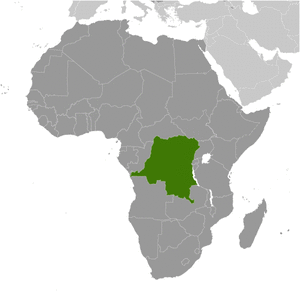Menu
CONGO DR
CONGO STATSCAPITAL: KINCHASA POPULATION: 75,507,308 LANGUAGE: FRENCH BELOW POVERTY: 71% ACCESS TO WATER: 47% ACCESS TO IMPROVED SANITATION: 31% AVERAGE ANNUAL INCOME: $655 CHRISTIAN: 92% |
PARTNERED NGOSince 1998, more than 6 million people in the Democratic Republic of Congo have lost their lives due to war and unrest. Every 60 seconds, a girl or woman is the victim of sexual assault. Countless families have been displaced from their homes—and each other. Each day, millions live under the threat of violence. For victims of violence, the local church is the path to peace and restoration.
|
HUMAN TRAFFICHINGThe Democratic Republic of the Congo (DRC) is a source and destination country for men, women, and children subjected to trafficking in persons, specifically conditions of forced laborand forced prostitution. The majority of this trafficking is internal, and much of it is perpetrated by armed groups and government forces outside government control within the country’s unstable eastern provinces. A significant number of unlicensed Congolese artisanal miners – men and boys – are exploited in situations of debt bondage by businessmen and supply dealers from whom they acquire cash advances, tools, food, and other provisions at inflated prices, and to whom they must sell the mined minerals at prices below the market value. The miners are forced to continue to work to repay constantly accumulating debts that are virtually impossible to repay. In North Kivu, South Kivu, and Katanga provinces, armed groups and Congolese national army (FARDC) troops reportedly use threats and coercion to force men and children to mine for minerals. A number of policemen in eastern DRC reportedly arrested people arbitrarily in order to extort money from them; those who could not pay were forced to work until they had "earned" their freedom. Congolese girls are forced into prostitution in tent- or hut-based brothels or informal camps.. Read More @ Wikipedia.org
CIVIL WARSBy 1996, following the Rwandan Civil War and genocide and the ascension of a Tutsi-led government, Rwandan Hutu militia forces (Interahamwe) fled to eastern Zaïre and used refugee camps as a base for incursion against Rwanda. They allied with the Zairian armed forces (FAZ) to launch a campaign against Congolese ethnic Tutsis in eastern Zaïre.
A coalition of Rwandan and Ugandan armies invaded Zaïre to overthrow the government of Mobutu, and ultimately control the mineral resources of Zaïre, launching the First Congo War. The coalition allied with some opposition figures, led by Laurent-Désiré Kabila, becoming the Alliance des Forces Démocratiques pour la Libération du Congo-Zaïre (AFDL). In 1997, Mobutu fled and Kabila marched into Kinshasa, naming himself president and reverting the name of the country to the Democratic Republic of the Congo. Kabila later requested that foreign military forces return to their countries because he was concerned that the Rwandan officers running his army were plotting a coup in order to give the presidency to a Tutsi who would report directly to the Rwandan president, Paul Kagame. Rwandan troops retreated to Goma and launched a new Tutsi led rebel military movement called the Rassemblement Congolais pour la Democratie (RCD) to fight against Kabila, while Uganda instigated the creation of new rebel movement called the Movement for the Liberation of Congo (MLC), led by the Congolese warlord Jean-Pierre Bemba. The two rebel movements, along with Rwandan and Ugandan troops, started the Second Congo War by attacking the DRC army in 1998. Angolan, Zimbabwean and Namibian militaries entered on the side of the government. Kabila was assassinated in 2001 and was succeeded by his son Joseph Kabila, who called for multilateral peace talks. UN peacekeepers, MONUC, now known as MONUSCO, arrived in April 2001. Talks led to the signing of a peace accord in which Kabila would share power with former rebels. By June 2003 all foreign armies except those of Rwanda had pulled out of Congo. A transitional government was set up until the election was over. A constitution was approved by voters, and on 30 July 2006 DRC held its first multi-party elections. An election result dispute between Kabila and Jean-Pierre Bemba turned into an all-out battle between their supporters in the streets of Kinshasa. MONUC took control of the city. A new election was held in October 2006, which Kabila won and on December 2006 he was sworn in as President. WIKIPEDIA |
CONGO DR NEWS |
|
NORTHERNPATH PART OF LIT INTERNATIONAL
|
NORTHERNPATH COPYRIGHT 2001-PRESENT
|

